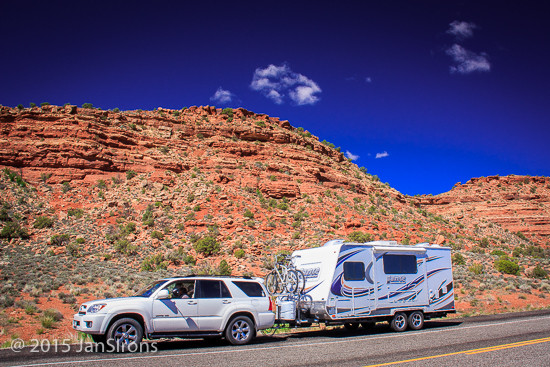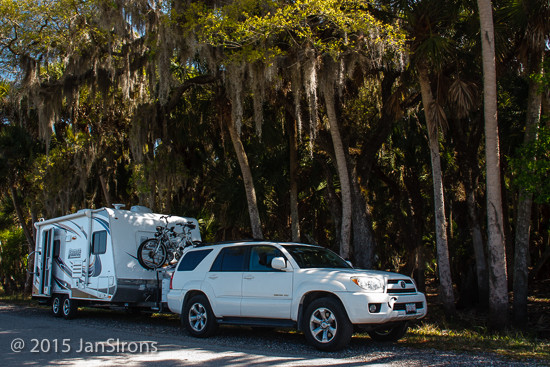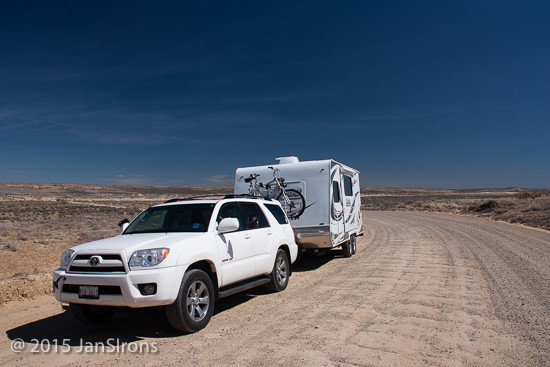Can A Toyota 4runner Pull A Camper? Absolutely, a Toyota 4Runner can tow a camper, offering a blend of reliability and capability that’s perfect for adventurers in and around Boise, Idaho; discover the towing prowess of the 4Runner at millertoyota.net, your local Toyota experts offering guidance, service, and a wide selection of 4Runners ready for your next adventure alongside various financing options. Explore various campers, towing capacity, and safety tips for 4Runner owners.
1. Understanding the Toyota 4Runner’s Towing Capacity
A Toyota 4Runner’s towing capacity is critical for safely hauling campers and other loads. Understanding the specifics of your 4Runner model ensures a safe and enjoyable towing experience.
1.1 What is the Standard Towing Capacity of a Toyota 4Runner?
The standard towing capacity of a Toyota 4Runner is 5,000 pounds; this capacity is consistent across various model years, providing ample power for towing smaller campers, boats, or trailers. This robust capability makes the 4Runner a popular choice for outdoor enthusiasts in areas like Boise, Idaho, where adventure is always on the horizon.
1.2 Factors Affecting Towing Capacity
Several factors can impact the towing capacity of your Toyota 4Runner.
- Weight Distribution: Proper weight distribution is crucial. According to trailer manufacturers, 60% of the weight should be in the front half of the trailer and 40% in the back to maintain stability and control.
- Hitch Type: The hitch type affects the maximum weight your 4Runner can safely tow. Using a weight distribution hitch is recommended for heavier loads to evenly distribute weight across the vehicle’s axles.
- Added Accessories: Accessories like roof racks, অতিরিক্ত bumpers, and winches add to the vehicle’s overall weight, reducing the maximum towable weight; it’s essential to account for these additions when calculating the total towing capacity.
1.3 How to Find Your 4Runner’s Specific Towing Capacity
To find your Toyota 4Runner’s specific towing capacity, consult your owner’s manual or check the sticker on the driver’s side door frame. This sticker provides essential information about your vehicle’s Gross Vehicle Weight Rating (GVWR) and Gross Combined Weight Rating (GCWR), which are vital for safe towing. For additional details and expert advice, visit millertoyota.net.
2. Selecting the Right Camper for Your Toyota 4Runner
Choosing the right camper for your Toyota 4Runner involves matching the camper’s weight and features to your vehicle’s towing capabilities. This ensures safe and enjoyable travels.
2.1 Types of Campers a 4Runner Can Tow
A Toyota 4Runner can tow various types of campers, including:
- Pop-Up Campers: These are lightweight and easy to tow, making them an excellent match for the 4Runner’s towing capacity. Their compact design expands at the campsite, offering a comfortable sleeping and living area.
- Small Travel Trailers: Some small travel trailers with dry weights under 4,000 pounds are suitable for towing with a 4Runner. These trailers often come equipped with basic amenities like a kitchenette and bathroom.
- Teardrop Trailers: Known for their aerodynamic design and lightweight construction, teardrop trailers are a popular choice for 4Runner owners. They typically include a sleeping area and a basic kitchen setup under the rear hatch.
2.2 Key Camper Features to Consider
When selecting a camper for your Toyota 4Runner, consider these key features:
- Weight: Always check the camper’s dry weight (the weight before adding water, cargo, and passengers) and ensure it is well within the 4Runner’s 5,000-pound towing capacity.
- Size: Smaller campers are easier to maneuver and put less strain on your vehicle. Consider the overall length and height of the camper to ensure it’s manageable for your towing experience.
- Amenities: Prioritize essential amenities like sleeping arrangements, kitchen facilities, and bathroom options based on your camping needs and preferences.
2.3 Recommended Camper Models for Toyota 4Runners
Several camper models are well-suited for towing with a Toyota 4Runner:
- Forest River Flagstaff E-Pro E19BH: With a dry weight of around 3,000 pounds, this travel trailer features bunk beds, a dinette, and a kitchen, making it ideal for families.
- Scamp 16: This fiberglass travel trailer is lightweight and durable, offering a comfortable interior with a kitchen, dining area, and sleeping space.
- TAXA Outdoors Cricket: This rugged and versatile camper provides a unique camping experience with its lightweight design and innovative features, perfect for off-road adventures.
To explore more options and find the perfect camper for your 4Runner, visit millertoyota.net for expert advice and recommendations.
 Forest River Flagstaff E-Pro E19BH travel trailer ideal for families
Forest River Flagstaff E-Pro E19BH travel trailer ideal for families
3. Essential Towing Equipment for a Toyota 4Runner
Equipping your Toyota 4Runner with the right towing gear is crucial for safety and performance. Selecting the appropriate hitch, wiring, and mirrors ensures a smooth and secure towing experience.
3.1 Choosing the Right Hitch
Choosing the right hitch is vital for safe towing. Consider these hitch types:
- Receiver Hitch: This is the most common type, mounting to the vehicle’s frame and accommodating various towing accessories.
- Weight Distribution Hitch: Recommended for heavier loads, it distributes weight evenly across the vehicle and trailer, improving stability and control.
- Ball Mount: This attaches to the receiver hitch and provides a connection point for the trailer coupler.
3.2 Wiring and Electrical Connections
Proper wiring and electrical connections are essential for operating trailer lights and brakes. Key considerations include:
- Trailer Wiring Harness: This connects the 4Runner’s electrical system to the trailer, providing power for lights, brakes, and other accessories.
- Brake Controller: Required for trailers with electric brakes, this allows the driver to control the trailer’s braking force.
- সাত-Way Connector: This standard connector provides connections for lights, brakes, auxiliary power, and ground.
3.3 Towing Mirrors and Safety Accessories
Towing mirrors and safety accessories enhance visibility and safety while towing. Essential items include:
- Extended Towing Mirrors: These provide a wider field of view, helping you see around the trailer and monitor traffic.
- Safety Chains: These connect the trailer to the vehicle, providing a backup connection in case the hitch fails.
- Tire Pressure Monitoring System (TPMS): This monitors tire pressure on both the vehicle and trailer, alerting you to potential issues.
Millertoyota.net offers a wide range of towing equipment and accessories to ensure your Toyota 4Runner is properly equipped for towing.
4. Preparing Your Toyota 4Runner for Towing
Preparing your Toyota 4Runner for towing involves essential maintenance and inspections. Ensuring your vehicle is in top condition guarantees a safe and reliable towing experience.
4.1 Vehicle Maintenance Checklist
Follow this maintenance checklist to prepare your 4Runner for towing:
- Check Fluids: Verify oil, coolant, brake fluid, and transmission fluid levels and top off if necessary.
- Inspect Tires: Check tire pressure and tread depth on both the vehicle and trailer. Ensure tires are properly inflated and in good condition.
- Test Lights: Confirm that all vehicle and trailer lights, including headlights, taillights, brake lights, and turn signals, are working correctly.
- Inspect Brakes: Check brake pads, rotors, and brake lines for wear and tear. Ensure the braking system is functioning optimally.
4.2 Suspension and Brake Upgrades
Consider these upgrades to enhance your 4Runner’s towing performance:
- Upgraded Suspension: Heavy-duty shocks, springs, or air suspension systems can improve stability and reduce sag when towing.
- Brake Controller: For trailers with electric brakes, a brake controller allows you to adjust the braking force and improve stopping power.
- Upgraded Brake Pads: High-performance brake pads provide increased stopping power and heat resistance, enhancing safety during towing.
4.3 Loading and Weight Distribution Tips
Proper loading and weight distribution are crucial for safe towing. Follow these tips:
- Distribute Weight Evenly: Place heavier items low and centered in the trailer to maintain stability.
- Secure Cargo: Use straps, nets, or tie-downs to secure cargo and prevent it from shifting during transit.
- Maintain Tongue Weight: Ensure the trailer’s tongue weight (the amount of weight pressing down on the hitch) is within the recommended range (usually 10-15% of the trailer’s total weight).
Visit millertoyota.net for expert service and maintenance to ensure your Toyota 4Runner is ready for any towing adventure.
 Loading cargo with evenly distributed weight
Loading cargo with evenly distributed weight
5. Safe Towing Practices with a Toyota 4Runner
Adhering to safe towing practices is essential for protecting yourself, your vehicle, and others on the road. Following speed limits, maintaining safe distances, and performing regular checks can prevent accidents and ensure a smooth journey.
5.1 Speed Limits and Safe Driving Speeds
Always adhere to posted speed limits and adjust your driving speed based on road conditions, weather, and the weight of your trailer. Safe towing speeds typically range from 55 to 65 mph, allowing for better control and shorter stopping distances.
5.2 Maintaining Safe Following Distances
Increase your following distance to at least four seconds when towing a trailer. This provides ample time to react to unexpected situations, such as sudden stops or changes in traffic flow.
5.3 Braking Techniques for Towing
Proper braking techniques are crucial for safe towing. Avoid sudden, hard braking, as this can cause the trailer to sway or jackknife. Instead, apply the brakes gradually and smoothly, allowing the vehicle and trailer to slow down in a controlled manner.
5.4 Turning and Maneuvering with a Trailer
When turning with a trailer, make wider turns to avoid hitting curbs or other obstacles. Use your mirrors to monitor the trailer’s position and adjust your steering accordingly. Practice maneuvering in an open area before hitting the road to become comfortable with the trailer’s handling characteristics.
5.5 Regular Checks and Maintenance During Travel
During long trips, perform regular checks to ensure everything is in good working order. Stop every few hours to inspect tires, lights, and connections. Check for loose or damaged components and address any issues promptly.
Millertoyota.net provides valuable resources and expert advice on safe towing practices, helping you enjoy worry-free adventures with your Toyota 4Runner.
6. Real-World Towing Experiences with a 4Runner
Hearing from other Toyota 4Runner owners about their towing experiences can provide valuable insights and tips for your own adventures. Understanding how others manage their towing setups and overcome challenges can enhance your confidence and preparedness.
6.1 Success Stories from 4Runner Owners
Many 4Runner owners have shared their positive towing experiences:
- John from Boise, ID: “I’ve been towing a pop-up camper with my 4Runner for years, and it’s been fantastic. The 4Runner handles the weight with ease, and I’ve never had any issues on our camping trips.”
- Sarah from Nampa, ID: “We recently upgraded to a small travel trailer, and our 4Runner tows it like a champ. The weight distribution hitch made a huge difference, and we feel safe and comfortable on the road.”
- Mike from Meridian, ID: “I use my 4Runner to tow my boat to the lake every weekend, and it’s the perfect vehicle for the job. The 4WD comes in handy at the boat ramp, and the towing capacity is more than enough.”
6.2 Challenges and How to Overcome Them
While the 4Runner is a capable towing vehicle, some owners have encountered challenges:
- Uphill Struggles: Some owners report that the 4Runner can struggle on steep uphill grades, especially with heavier loads. To overcome this, shift into a lower gear and maintain a steady speed.
- Fuel Efficiency: Towing a trailer can significantly reduce fuel efficiency. Plan your route accordingly and be prepared for more frequent fuel stops.
- Trailer Sway: Trailer sway can be a concern, especially in windy conditions. Use a sway control device and adjust your driving speed to maintain stability.
6.3 Modifications and Upgrades for Improved Towing
To enhance the towing performance of your 4Runner, consider these modifications and upgrades:
- Transmission Cooler: An auxiliary transmission cooler can help prevent overheating and extend the life of your transmission.
- Airbags or Helper Springs: These can improve stability and reduce sag when towing heavy loads.
- Electric Brake Controller: Essential for trailers with electric brakes, this allows you to adjust the braking force and improve stopping power.
Millertoyota.net connects you with a community of 4Runner enthusiasts and experts who can share their experiences and offer valuable advice on towing with your vehicle.
 Toyota 4Runner towing a boat to the lake
Toyota 4Runner towing a boat to the lake
7. Comparing the 4Runner to Other Towing Vehicles
When considering a vehicle for towing, it’s essential to compare the Toyota 4Runner to other options. Evaluating factors like towing capacity, fuel efficiency, and reliability can help you make an informed decision.
7.1 Towing Capacity Comparison
- Toyota 4Runner: The 4Runner offers a standard towing capacity of 5,000 pounds, suitable for smaller campers, boats, and trailers.
- Toyota Tacoma: The Tacoma can tow between 3,500 and 6,800 pounds, depending on the engine and configuration, providing more versatility for larger loads.
- Toyota Tundra: The Tundra is a full-size truck with a towing capacity ranging from 8,800 to 10,200 pounds, making it ideal for heavy-duty towing needs.
- Ford Explorer: The Explorer can tow up to 5,600 pounds, offering similar capabilities to the 4Runner.
- Jeep Grand Cherokee: The Grand Cherokee boasts a towing capacity of up to 7,200 pounds, providing more power for larger trailers.
7.2 Fuel Efficiency Considerations
- Toyota 4Runner: The 4Runner typically achieves around 16-19 mpg in city driving and 19-22 mpg on the highway, which can decrease significantly when towing.
- Toyota Tacoma: The Tacoma offers slightly better fuel efficiency, with around 18-20 mpg in the city and 22-24 mpg on the highway.
- Toyota Tundra: The Tundra has lower fuel efficiency, with around 13-15 mpg in the city and 17-19 mpg on the highway.
- Ford Explorer: The Explorer achieves around 21 mpg in the city and 28 mpg on the highway, making it a more fuel-efficient option.
- Jeep Grand Cherokee: The Grand Cherokee offers similar fuel efficiency to the Explorer, with around 19 mpg in the city and 26 mpg on the highway.
7.3 Reliability and Maintenance Costs
- Toyota 4Runner: The 4Runner is known for its exceptional reliability and low maintenance costs, making it a dependable choice for long-term ownership.
- Toyota Tacoma: The Tacoma shares the 4Runner’s reputation for reliability, with similar maintenance costs.
- Toyota Tundra: The Tundra is also highly reliable, though its larger size may result in slightly higher maintenance costs.
- Ford Explorer: The Explorer has average reliability ratings, with maintenance costs comparable to other SUVs in its class.
- Jeep Grand Cherokee: The Grand Cherokee has slightly lower reliability ratings than the Toyota models, with potentially higher maintenance costs.
Millertoyota.net offers detailed comparisons and expert advice to help you choose the best towing vehicle for your needs and budget.
8. Maintaining Your 4Runner After Towing
Proper maintenance after towing is essential to prolong the life of your Toyota 4Runner and ensure it remains in top condition. Regular inspections, fluid checks, and cleaning can help prevent premature wear and tear.
8.1 Post-Towing Inspection Checklist
After each towing trip, perform the following inspection:
- Check Tires: Inspect tires for wear and damage, and ensure they are properly inflated.
- Inspect Brakes: Check brake pads, rotors, and brake lines for wear and tear.
- Check Suspension: Inspect shocks, springs, and other suspension components for damage or wear.
- Check Fluids: Verify oil, coolant, brake fluid, and transmission fluid levels and top off if necessary.
- Inspect Hitch: Check the hitch and related components for damage or loose connections.
8.2 Fluid Checks and Replacements
Regularly check and replace fluids to maintain optimal performance:
- Oil Change: Follow the recommended oil change interval to keep the engine running smoothly.
- Transmission Fluid: Check and replace transmission fluid as needed to prevent overheating and ensure proper shifting.
- Coolant: Maintain proper coolant levels to prevent overheating and protect the engine.
- Brake Fluid: Check and replace brake fluid to ensure optimal braking performance.
8.3 Cleaning and Storage Tips
Proper cleaning and storage can help protect your 4Runner and towing equipment:
- Wash the Vehicle: Wash the vehicle to remove dirt, grime, and road salt, which can cause corrosion.
- Clean the Hitch: Clean the hitch and related components to prevent rust and corrosion.
- Store Equipment Properly: Store towing equipment in a dry, secure location to prevent damage and theft.
Millertoyota.net offers comprehensive service and maintenance to keep your Toyota 4Runner in top condition, ensuring it’s always ready for your next towing adventure.
 Cottonwood Canyon Road, Grand Staircase Escalante National Monument, UT
Cottonwood Canyon Road, Grand Staircase Escalante National Monument, UT
9. Accessories to Enhance Your Towing Experience
Enhance your towing experience with practical accessories that improve safety, convenience, and performance. From backup cameras to cargo organizers, these additions can make towing more enjoyable and stress-free.
9.1 Backup Cameras and Monitoring Systems
Backup cameras and monitoring systems provide added visibility and safety when maneuvering with a trailer:
- Backup Camera: A backup camera allows you to see what’s behind the trailer, making it easier to back up and park.
- Tire Pressure Monitoring System (TPMS): A TPMS monitors tire pressure on both the vehicle and trailer, alerting you to potential issues.
- Blind Spot Monitoring: Blind spot monitoring systems alert you to vehicles in your blind spots, improving safety when changing lanes.
9.2 Cargo Management and Organization
Cargo management and organization accessories help keep your gear secure and accessible:
- Cargo Nets: Cargo nets secure loose items and prevent them from shifting during transit.
- Cargo Boxes: Cargo boxes provide additional storage space and protect your gear from the elements.
- Tie-Down Straps: Tie-down straps secure larger items and prevent them from moving around.
9.3 Protective Gear for Your Vehicle
Protective gear helps keep your vehicle looking its best and prevents damage:
- Mud Flaps: Mud flaps protect the vehicle from mud, rocks, and other debris.
- Paint Protection Film: Paint protection film protects the vehicle’s paint from scratches and chips.
- Seat Covers: Seat covers protect the seats from wear and tear.
Millertoyota.net offers a wide range of accessories to enhance your towing experience, ensuring you’re well-equipped for any adventure.
10. Frequently Asked Questions (FAQs) About Towing with a Toyota 4Runner
Find answers to common questions about towing with a Toyota 4Runner, including towing capacity, safety tips, and recommended equipment.
10.1 What is the maximum towing capacity of a Toyota 4Runner?
The maximum towing capacity of a Toyota 4Runner is 5,000 pounds, providing ample power for towing smaller campers, boats, or trailers.
10.2 Can a Toyota 4Runner tow a travel trailer?
Yes, a Toyota 4Runner can tow a travel trailer, but it’s essential to choose a trailer with a dry weight under 4,000 pounds to stay within the vehicle’s towing capacity.
10.3 What type of hitch is recommended for towing with a 4Runner?
A receiver hitch is the most common type, but a weight distribution hitch is recommended for heavier loads to evenly distribute weight across the vehicle and trailer.
10.4 Do I need a brake controller for towing with a 4Runner?
A brake controller is required for trailers with electric brakes, allowing the driver to control the trailer’s braking force and improve stopping power.
10.5 What are the best tires for towing with a Toyota 4Runner?
Michelin tires are a popular choice among 4Runner owners for their durability and performance, providing excellent traction and stability when towing.
10.6 How can I improve the fuel efficiency of my 4Runner when towing?
To improve fuel efficiency when towing, maintain a steady speed, avoid hard acceleration and braking, and ensure your tires are properly inflated.
10.7 What safety precautions should I take when towing with a 4Runner?
Safety precautions include adhering to speed limits, maintaining safe following distances, using proper braking techniques, and performing regular checks on tires, lights, and connections.
10.8 How often should I service my 4Runner when towing regularly?
When towing regularly, it’s recommended to service your 4Runner more frequently, including oil changes, fluid checks, and brake inspections, to ensure optimal performance and prevent premature wear.
10.9 Can I tow off-road with a Toyota 4Runner?
Yes, the Toyota 4Runner is well-suited for off-road towing, thanks to its 4WD system and good ground clearance. However, it’s essential to exercise caution and choose appropriate routes.
10.10 Where can I find reliable towing equipment and accessories for my 4Runner?
Reliable towing equipment and accessories for your 4Runner can be found at millertoyota.net, your local Toyota experts offering guidance, service, and a wide selection of towing products.
Ready to start your next adventure? Visit millertoyota.net today to explore our selection of Toyota 4Runners and towing accessories. Our expert team is here to help you find the perfect vehicle and equipment for your towing needs. Contact us at +1 (208) 376-8888 or stop by our dealership at 208 N Maple Grove Rd, Boise, ID 83704, United States.